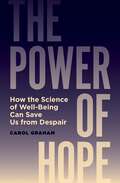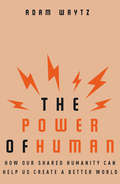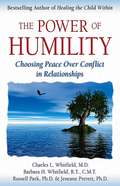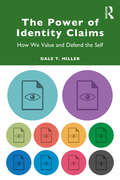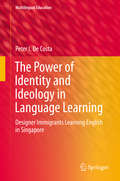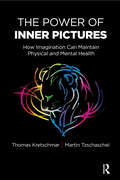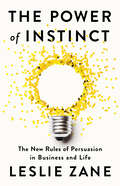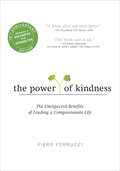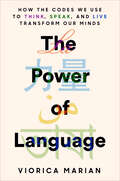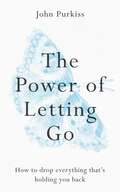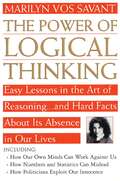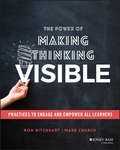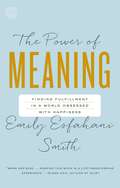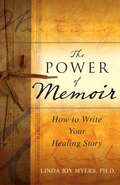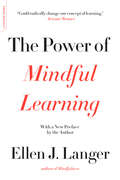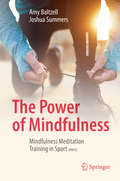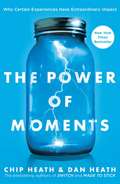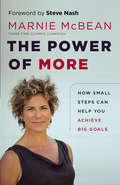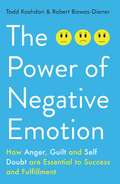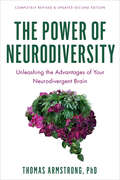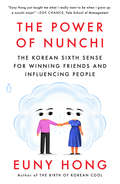- Table View
- List View
The Power of Hope: How the Science of Well-Being Can Save Us from Despair
by Carol GrahamWhy hope matters as a metric of economic and social well-beingIn a society marked by extreme inequality of income and opportunity, why should economists care about how people feel? The truth is that feelings of well-being are critical metrics that predict future life outcomes. In this timely and innovative account, economist Carol Graham argues for the importance of hope—little studied in economics at present—as an independent dimension of well-being. Given America’s current mental health crisis, thrown into stark relief by COVID, hope may be the most important measure of well-being, and researchers are tracking trends in hope as a key factor in understanding the rising numbers of “deaths of despair” and premature mortality.Graham, an authority on the study of well-being, points to empirical evidence demonstrating that hope can improve people’s life outcomes and that despair can destroy them. These findings, she argues, merit deeper exploration. Graham discusses the potential of novel well-being metrics as tracking indicators of despair, reports on new surveys of hope among low-income adolescents, and considers the implications of the results for the futures of these young adults.Graham asks how and why the wealthiest country in the world has such despair. What are we missing? She argues that public policy problems—from joblessness and labor force dropout to the lack of affordable health care and inadequate public education—can’t be solved without hope. Drawing on research in well-being and other disciplines, Graham describes strategies for restoring hope in populations where it has been lost. The need to address despair, and to restore hope, is critical to America’s future.
The Power of Human: How Our Shared Humanity Can Help Us Create A Better World
by Adam WaytzAn urgent yet hopeful analysis of the surge in dehumanization, and how we can reverse it. The unprecedented access to other humans that technology provides has ironically freed us from engaging with them. Thanks to social media, we can know a campaigning politician’s platform; an avid traveler’s restaurant recommendations; and the daily emotional fluctuations of our friends without ever even picking up the phone. According to social psychologist Adam Waytz, our increasingly human-free lives come with a serious cost that we’ve already begun to pay: the loss of our humanity. Humans have superpowers. More than any other psychological stimulus, our presence can make experiences feel significant, inspire moral behavior, and encourage action. Recent studies suggest that we even have power over mortality—the survival rate of individuals with stronger social relationships has been found to be twice as high as those with weak relationships. The Power of Human shows us how to rehumanize and harness these unique abilities to improve our lives, beginning with our jobs. The remedy for the dehumanized worker is twofold. Employers, Waytz argues, must instill humanity into work by capitalizing on distinctly human skills, especially sociability and variability. Meanwhile, workers need to put to rest the idea that you are what you do and instead detach their personal identities from their occupations. Waytz offers a similarly science-based method to counter the rising threat that technology poses to our humanity, outlining how we can design human-machine partnerships that optimize the strengths of both parties. Finally, he reveals how, by humanizing intimacy and conflict in unexpected ways, we can strengthen relationships with both our friends and enemies. Essential reading for individuals and institutions alike, The Power of Human explains how we can solve one of our time’s biggest problems by better utilizing the influence we have on one another.
The Power of Humility: Choosing Peace over Conflict in Relationships
by Dr. Charles Whitfield Barbara Harris Whitfield Russell ParkThroughout our life, at each moment, from each conflict that arises throughout every day, we are given the power to choose. We all face challenges in our relationships and Dr. Whitfield gives us the secret to meeting each challenge and how to make the best choice when faced with hard decisions and irrational emotions. Using the same questions he has asked his patients, Dr. Whitfield asks readers: Do you choose to protect your point of view, your position, and your ego's limited perceptions? Or do you choose humility: open-mindedness, curiosity, and tolerance? Do you choose to play the victim, to persecute or to rescue? Or do you choose humility: to motivate, nurture, and empower? Do you choose separation, or through humility, inclusion? These are the lessons taught in The Power of Humility. Simple, easy to understand, yet life changing, Dr. Whitfield teaches us that by accepting our "humility" we invite peace, love, joy, and gratitude into our life and our relationships. Key Features Patient stories provide the reader with specific examples on the power of humility. Takes readers through the separate steps in identifying humility throughout their lives. Tie in to reissue of Dr. Whitfield’s million copy classic Healing the Child Within.
The Power of Identity Claims: How We Value and Defend the Self
by Dale T. MillerThis book draws on research in psychology and behavioral economics to show how striving to live up to our identity claims profoundly affects our daily lives. The author argues the claims we make about who we are and what we stand for powerfully influence us, and our social world. Asking questions such as: Why do people resist the temptation to cheat when cheating would benefit them greatly and no one would find out? Why do people express different beliefs about climate change when they are first reminded of their political affiliation? Why do people prefer to be compensated for donating blood with cholesterol screening than with money? Miller puts forth a novel and compelling argument regarding how strongly our identity claims affect our daily lives. The book provides explanations for many forms of puzzling behavior, such as why people sometimes act against their economic self-interest, how they avoid situations that test their moral identities, and how they respond to failures to live up to their moral identities. It paints an intriguing picture of people’s investment in their identity claims by showing how they seek opportunities to demonstrate their validity, avoid actions and circumstances that challenge their legitimacy, and employ psychological defenses when others challenge their legitimacy. Based on extensive research in the fields of psychology, economics, and political science, this book is fascinating reading for students and academics interested in identity and the self. It also provides an expanded tool kit for those who seek behavioral change in their organization or community.
The Power of Identity and Ideology in Language Learning
by Peter I. De CostaThis critical ethnographic school-based case study offers insights onthe interaction between ideology and the identity development of individualEnglish language learners in Singapore. Illustrated by case studies of thelanguage learning experiences of five Asian immigrant students in anEnglish-medium school in Singapore, the author examines how the immigrantstudents negotiated a standard English ideology and their discursivepositioning over the course of the school year. Specifically, the study traceshow the prevailing standard English ideology interacted in highly complex wayswith their being positioned as high academic achievers to ultimately influencetheir learning of English. This potent combination of language ideologies andcirculating ideologies created a designer student immigration complex. Byframing this situation as a complex, the study problematizes the power of ideologiesin shaping the trajectories and identities of language learners.
The Power of Inner Pictures: How Imagination Can Maintain Physical and Mental Health
by Thomas KretschmarThis book is about inner pictures and how we can access and change these pictures through our imagination. It is written not only for specialists in the field of psychotherapy and coaching, but also for the general public. With the authors as specialists in the field, the authors have created a joint book that is both comprehensive and understandable for everybody. The authors start by exploring inner pictures in general and how they influence us in everyday life, in memories, and in dreams, using examples from sports, business and other fields. The book then examines how inner pictures and the imagination can be used for therapy. The applications are drawn both from medical and non-medical treatments, including biofeedback, sleep, hypnosis, autogenic training, and the healing of physical diseases. The authors then examine the methods of imaginative psychotherapy. Additional contemporary methods are also utilised, to make this a completely up-to-date interventional approach.
The Power of Instinct: The New Rules of Persuasion in Business and Life
by Leslie ZaneAward-winning Fortune 500 brand consultant and behavioral expert Leslie Zane shatters conventional marketing wisdom, showing readers how to tap into the hidden brain where instinct prevails, creating a powerful network of connections that drive people to buy your product, company, or vision. People don&’t make decisions with their conscious mind, but on instinct. In The Power of Instinct, marketing consultant and behavioral science expert Leslie Zane shows that to grow a brand, business, or even a social movement, traditional persuasion tactics fall short. Instead, you must connect to the instinctive mind. And to do this, you need to understand the science of consumer choice and employ techniques that work with a person&’s brain, not against it. Zane uncovers the hidden network of connections that dictates the snap decisions we make and cracks the code on how to influence it. With a revolutionary set of rules for expanding the network, Zane shows us how to make any brand, business, political candidate, or idea the dominant instinctive choice. With science as your guide, as well as stories from the world&’s most successful brands from McDonald's and Lululemon to the Yankees and Taylor Swift, you'll learn: What kind of messages create the greatest amount of positive associations; Why finding new customers accelerates growth and relying on existing ones is a trap; Why emotional stories are not enough to drive trial and long-term brand loyalty. Whether you're an entrepreneur, Fortune 500 executive, marketing professional, or job seeker, mastering the power of instinct will help supercharge your growth and make whatever you&’re selling the first choice for any audience.
The Power of Kindness
by Piero FerrucciPiero Ferrucci warns against the dangers of "global cooling. " As the pace of living grows faster and the impact of new technologies more insistent, communications become hurried and impersonal. The drive for profit overrides the heart. Warmth and genuine presence fade. The Power of Kindness is a stirring examination of a simple but profound concept. Piero Ferrucci, one of the world's most respected transpersonal psychologists, explores the many surprising facets of kindness and argues that it is this trait that will not only lead to our own individual happiness and the happiness of those around us, but will guide us in a world that has become cold, anxious, difficult, and frightening. In eighteen interlocking chapters, Dr. Ferrucci reveals that the kindest people are the most likely to thrive, to enable others to thrive, and to slowly but steadily turn our world away from violence, self-centeredness, and narcissism- and toward love. Writing with a rare combination of sensitivity and intellectual depth, Dr. Ferrucci shows that, ultimately, kindness is not a luxury in our world but rather a necessity for us all. .
The Power of Kindness: The Unexpected Benefits of Leading a Compassionate Life
by Dalai Lama Piero Ferrucci"A book after my own heart!"--His Holiness The Dalai LamaThe Power of Kindness is a stirring examination of a simple but profound concept. Piero Ferrucci, one of the world's most respected transpersonal psychologists, explores the many surprising facets of kindness and argues that it is this trait that will not only lead to our own individual happiness and the happiness of those around us, but will guide us in a world that has become cold, anxious, difficult, and frightening.Piero Ferrucci warns against the dangers of "global cooling." As the pace of living grows faster and the impact of new technologies more insistent, communications become hurried and impersonal. The drive for profit overrides the heart. Warmth and genuine presence fade.In eighteen interlocking chapters, Dr. Ferrucci reveals that the kindest people are the most likely to thrive, to enable others to thrive, and to slowly but steadily turn our world away from violence, self-centeredness, and narcissism- and toward love. Writing with a rare combination of sensitivity and intellectual depth, Dr. Ferrucci shows that, ultimately, kindness is not a luxury in our world but rather a necessity for us all.
The Power of Language: How the Codes We Use to Think, Speak, and Live Transform Our Minds
by Viorica Marian&“Sparkles with insight.&”—Daniel PinkThis revolutionary book goes beyond any recent book on language to dissect how language operates in our minds and how to harness its virtually limitless power. As Dr. Marian explains, while you may well think you speak only one language, in fact your mind accommodates multiple codes of communication. Some people speak Spanish, some Mandarin. Some speak poetry, some are fluent in math. The human brain is built to use multiple languages, and using more languages opens doors to creativity, brain health, and cognitive control. Every new language we speak shapes how we extract and interpret information. It alters what we remember, how we perceive ourselves and the world around us, how we feel, the insights we have, the decisions we make, and the actions we take. Language is an invaluable tool for organizing, processing, and structuring information, and thereby unleashing radical advancement. Learning a new language has broad lifetime consequences, and Dr. Marian reviews research showing that it: · Enhances executive function—our ability to focus on the things that matter and ignore the things that don&’t. · Results in higher scores on creative-thinking tasks. · Develops critical reasoning skills. · Delays Alzheimer&’s and other types of dementia by four to six years. · Improves decisions made under emotional duress. · Changes what we see, pay attention to, and recall.
The Power of Letting Go: How to drop everything that's holding you back
by John PurkissIf you learn to let go,your life will take off.When you let go, you live intuitively. Everything flows, because you are no longer attached to things being a certain way, to being a certain person or always being right. What a relief. The irony is that when you feel stuck in any area of your life - career, relationships, purpose, health or money - letting go can seem very hard. You cling on for dear life just at the moment you need to take the leap.In The Power of Letting Go, John Purkiss explains why we should let go and how we can do it, using proven techniques to make things happen.The stages of letting go:-Be Present and Enjoy Each Moment-Let Go of the Thoughts that Keep You Stuck-Let Go of the Pain that Runs Your Life-Surrender and Tune into Something Far More Intelligent than Your Brain(p) 2020 Octopus Publishing Group
The Power of Letting Go: How to drop everything that's holding you back
by John PurkissTHE ACCOMPANYING JOURNAL - LEARN TO LET GO - OUT NOW 'Life-changing' - Sara Makin, Founder & CEO of Makin Wellness If you learn to let go,your life will take off.When you let go, you live intuitively. Everything flows, because you are no longer attached to things being a certain way, to being a certain person or always being right. What a relief. The irony is that when you feel stuck in any area of your life - career, relationships, purpose, health or money - letting go can seem very hard. You cling on for dear life just at the moment you need to take the leap.In The Power of Letting Go, John Purkiss explains why we should let go and how we can do it, using proven techniques to make things happen.The stages of letting go:-Be Present and Enjoy Each Moment-Let Go of the Thoughts that Keep You Stuck-Let Go of the Pain that Runs Your Life-Surrender and Tune into Something Far More Intelligent than Your Brain
The Power of Letting Go: How to drop everything that's holding you back
by John PurkissTHE ACCOMPANYING JOURNAL - LEARN TO LET GO - OUT NOW 'Life-changing' - Sara Makin, Founder & CEO of Makin Wellness If you learn to let go,your life will take off.When you let go, you live intuitively. Everything flows, because you are no longer attached to things being a certain way, to being a certain person or always being right. What a relief. The irony is that when you feel stuck in any area of your life - career, relationships, purpose, health or money - letting go can seem very hard. You cling on for dear life just at the moment you need to take the leap.In The Power of Letting Go, John Purkiss explains why we should let go and how we can do it, using proven techniques to make things happen.The stages of letting go:-Be Present and Enjoy Each Moment-Let Go of the Thoughts that Keep You Stuck-Let Go of the Pain that Runs Your Life-Surrender and Tune into Something Far More Intelligent than Your Brain
The Power of Logical Thinking: Easy Lessons in the Art of Reasoning...and Hard Facts About Its Absence in Our Lives
by Marilyn Vos SavantA classic of critical thinking that is now more urgent than ever! America has become a society devoid of understanding of the power of logic and numbers. All too often, we rely on our intuition or on empty statistics to formulate opinions about ourselves and our world. As a result of inadequate schooling in the art of reasoning, we have become a people unable to make truly logical decisions, intimidated by numbers, and too passive to reverse this disturbing trend. The Power of Logical Thinking addresses these concerns, illustrating how you can reason better, how numbers are used against you, and how your vote may be affected. Marilyn vos Savant writes, "We can't trust our intuitions, our statisticians, or our politicians. The 1992 presidential campaign is a case in point. Numbers were used, abused, and misused by the candidates as never before in the history of our country. Voters were easily manipulated, setting a precedent for years to come."
The Power of Making Thinking Visible: Practices to Engage and Empower All Learners
by Ron Ritchhart Mark ChurchThe long-awaited follow-up to Making Thinking Visible, provides new thinking routines, original research, and unique global case studies Visible Thinking—a research-based approach developed at Harvard’s Project Zero – prompts and promotes students’ thinking. This approach has been shown to positively impact student engagement, learning, and development as thinkers. Visible Thinking involves using thinking routines, documentation, and effective questioning and listening techniques to enhance learning and collaboration in any learning environment. The Power of Making Thinking Visible explains how educators can effectively use thinking routines and other tools to engage and empower students as learners and transform classrooms into places of deep learning. Building on the success of the bestselling Making Thinking Visible, this highly-anticipated new book expands the work of the original by providing 18 new thinking routines based on new research and work with teachers and students around the world. Original content explains how to use thinking routines to maximum effect in the classroom, engage students exploration of big ideas, link thinking routines to formative assessment, and more. Providing new research, new global case studies, and new practices, this book: Focuses on the power that thinking routines can bring to learning Provides practical insights on using thinking routines to facilitate student engagement Highlights the most effective techniques for using thinking routines in the classroom Identifies the skillsets and mindsets needed to truly make thinking visible Features actionable classroom strategies that can be applied across grade levels and content areas Written by researchers from Harvard’s Project Zero, The Power of Making Thinking Visible: Using Routines to Engage and Empower Learners is an indispensable resource for K-12 educators and curriculum designers, higher education instructional designers and educators, and professional learning course developers.
The Power of Meaning: Crafting A Life That Matters
by Emily Esfahani SmithIn a culture obsessed with happiness, this wise, stirring book points the way toward a richer, more satisfying life.Too many of us believe that the search for meaning is an esoteric pursuit—that you have to travel to a distant monastery or page through dusty volumes to discover life’s secrets. The truth is, there are untapped sources of meaning all around us—right here, right now.To explore how we can craft lives of meaning, Emily Esfahani Smith synthesizes a kaleidoscopic array of sources—from psychologists, sociologists, philosophers, and neuroscientists to figures in literature and history such as George Eliot, Viktor Frankl, Aristotle, and the Buddha. Drawing on this research, Smith shows us how cultivating connections to others, identifying and working toward a purpose, telling stories about our place in the world, and seeking out mystery can immeasurably deepen our lives.To bring what she calls the four pillars of meaning to life, Smith visits a tight-knit fishing village in the Chesapeake Bay, stargazes in West Texas, attends a dinner where young people gather to share their experiences of profound loss, and more. She also introduces us to compelling seekers of meaning—from the drug kingpin who finds his purpose in helping people get fit to the artist who draws on her Hindu upbringing to create arresting photographs. And she explores how we might begin to build a culture that leaves space for introspection and awe, cultivates a sense of community, and imbues our lives with meaning.Inspiring and story-driven, The Power of Meaning will strike a profound chord in anyone seeking a life that matters.
The Power of Memoir
by Linda MyersA groundbreaking work for healing long-term emotional problemsThe Power of Memoir is a pioneering how-to book that provides a new step-by-step program to use memoir writing as a therapeutic process. By going through these steps you'll learn how to choose the significant milestones and turning points that make up a coherent story leading to a life-changing epiphany. Help uncover the secret stories that are the keys to healing Explore the dynamics and roles of dysfunctional families Heal old wounds, creating a better present and brighter futureUsing many examples from her students and clients, the author shows how creative, well-planned, and carefully researched memoir writing can offer a process for sorting out the truth from lies and family myths.
The Power of Mindful Learning (A Merloyd Lawrence Book)
by Ellen J. LangerRadical in its implications, this original and important work may change forever the views we hold about the nature of learning. In The Power of Mindful Learning, Ellen Langer uses her innovative theory of mindulness, introduced in her influential earlier book, to dramatically enhance the way we learn. In business, sports, laboratories, or at home, our learning is hobbled by certain antiquated and pervasive misconceptions. In this pithy, liberating, and delightful book she gives us a fresh, new view of learning in the broadest sense. Such familiar notions as delayed gratification, ”the basics”, or even ”right answers”, are all incapacitating myths which Langer explodes one by one. She replaces them with her concept of mindful or conditional learning which she demonstrates, with fascinating examples from her research, to be extraordinarily effective. Mindful learning takes place with an awareness of context and of the ever-changing nature of information. Learning without this awareness, as Langer shows convincingly, has severely limited uses and often sets on up for failure.With stunning applications to skills as diverse as paying attention, CPR, investment analysis, psychotherapy, or playing a musical instrument, The Power of Mindful Learning is for all who are curious and intellectually adventurous.
The Power of Mindfulness: Mindfulness Meditation Training in Sport (MMTS)
by Amy Baltzell Joshua SummersThis book offers both sport psychology practitioners and sport athletes a clear understanding of mindfulness to help athletes optimize sport performance. It provides a clear insight how sport athletes can learn to increase their ability to concentrate, be fully present during high pressure competition and how to effectively respond to distracting thoughts and emotions (e.g. performance anxiety; dread). The strategies offered in the chapters are based on Mindfulness Meditation Training for Sport (MMTS), an empirically supported mindfulness intervention for sport, which was created by the authors. MMTS has been adopted internationally by practicing sport psychologists – used with collegiate, club, and Olympic teams. Through offering a clear explanation of mindfulness and self-compassion (an essential element of MMTS), brief mindfulness based practices, and consistently offering how such practices link to performance – the reader learns to implement all of MMTS or elements of MMTS to help the increase their ability to focus, cope with difficult emotions, and perform their best when it matters.
The Power of Moments: Why Certain Experiences Have Extraordinary Impact
by Chip Heath Dan HeathThe New York Times bestselling authors of Switch and Made to Stick explore why certain brief experiences can jolt us and elevate us and change us—and how we can learn to create such extraordinary moments in our life and work.While human lives are endlessly variable, our most memorable positive moments are dominated by four elements: elevation, insight, pride, and connection. If we embrace these elements, we can conjure more moments that matter. What if a teacher could design a lesson that he knew his students would remember twenty years later? What if a manager knew how to create an experience that would delight customers? What if you had a better sense of how to create memories that matter for your children? This book delves into some fascinating mysteries of experience: Why we tend to remember the best or worst moment of an experience, as well as the last moment, and forget the rest. Why &“we feel most comfortable when things are certain, but we feel most alive when they&’re not.&” And why our most cherished memories are clustered into a brief period during our youth. Readers discover how brief experiences can change lives, such as the experiment in which two strangers meet in a room, and forty-five minutes later, they leave as best friends. (What happens in that time?) Or the tale of the world&’s youngest female billionaire, who credits her resilience to something her father asked the family at the dinner table. (What was that simple question?) Many of the defining moments in our lives are the result of accident or luck—but why would we leave our most meaningful, memorable moments to chance when we can create them? The Power of Moments shows us how to be the author of richer experiences.
The Power of More
by Steve Nash Marnie McbeanThe Power of More shows readers how to accomplish their goals, big or small. Whether you are a novice runner who wants to run a 10k race, a sales rep who wants to increase market share, or an elite athlete trying to conquer the world stage, you can achieve your ambition by believing in the importance of doing a little bit more.With humour and insight, three-time Olympic champion Marnie McBean discusses the importance of breaking big goals down into manageable bits of "more." The Power of More is about concentrating not on the more you can get but the more that you can do. Even when you think you're done, you aren't -- chances are you have a bit more to give.
The Power of Negative Emotion: How Anger, Guilt, and Self Doubt are Essential to Success and Fulfillment
by Robert Biswas-Diener Todd B KashdanMindfulness, kindness, and positivity can take us far. But they cannot take us all the way. Sometimes, they can even hold us back. Emotions like anger, anxiety, or doubt might be uncomfortable, but it turns out that they are also incredibly useful. Kashdan and Biswas-Diener explain the importance of developing our "emotional agility" - the ability to access our full range of emotions (not just the "good" ones). Find out how: Anger fuels creativity Guilt sparks improvement Self-doubt enhances performance Selfishness increases courage Mindlessness leads to better decisionsDrawing on years of scientific research and a wide array of real-life examples including sports, the military, parenting, education, relationships, business, and more, The Power of Negative Emotion is a refreshing reality check against the constant exhortations to be mindful and think positively.
The Power of Neurodiversity: Unleashing the Advantages of Your Differently Wired Brain (published in hardcover as Neurodiversity)
by Thomas ArmstrongOC Parents, teachers, and policymakers should all read this thought-provoking book. I loved it. OCOOCoTemple Grandin, author of "Thinking in Pictures "
The Power of Neurodiversity: Unleashing the Advantages of Your Differently Wired Brain (published in hardcover as Neurodiversity)
by Thomas ArmstrongFrom a bestselling author and psychologist, an exploration and celebration of neurodivergence, completely revised with the most up-to-date research and insights. From ADHD and dyslexia to autism, the number of diagnosis categories listed by the American Psychiatric Association has tripled in the last fifty years. With so many people affected, it is time to revisit our perceptions of people with disabilities. Thomas Armstrong illuminates a new understanding of neuropsychological disorders. He argues that if they are a part of the natural diversity of the human brain, they cannot simply be defined as illnesses. Armstrong explores the evolutionary advantages, special skills, and other positive dimensions of these conditions, including: autism, ADHD, dyslexia, schizophrenia, anxiety, intellectual disabilities, and mood disorders. With an emphasis on positive niche construction for each area, The Power of Neurodiversity is a manifesto as well as a keen look at disability, as well as a must-read for parents, teachers, and anyone who is looking to learn more about neurodivergence.
The Power of Nunchi: The Korean Secret to Happiness and Success
by Euny HongImprove your nunchi. Improve your life.The Korean sixth sense for winning friends and influencing people, nunchi (pronounced noon-chee) can help you connect with others so you can succeed in everything from business to love. The Power of Nunchi will show you how.If you're thinking, "Not another Eastern fad: Marie Kondo already made me throw away half my clothes," don't worry--it's not a fad. Nunchi has been used by Koreans for more than 5000 years. It's what catapulted their nation from one of the world's poorest to one of the richest and most technologically advanced in half a century. And it's why K-pop--an unlikely global phenomenon, performed as it is in a language spoken only in Korea--is even a thing.The art of reading a room and understanding what others are thinking and feeling, nunchi is a form of emotional intelligence that anyone can learn--all you need is your eyes and ears. Have you ever wondered why your less-skilled coworker gets promoted before you, or why that one woman from your yoga class is always surrounded by adoring friends? They probably have great nunchi. Sherlock Holmes has great nunchi. Cats have great nunchi. Steve Jobs had great nunchi. With its focus on observing others rather than asserting yourself--it's not all about you!--nunchi is a refreshing antidote to our culture of self-promotion, and a welcome reminder to look up from your cell phone.Not some quaint Korean custom like taking off your shoes before entering a house, nunchi is the currency of life. The Power of Nunchi will show you how the trust and connection it helps you to build can open doors for you that you never knew existed.
